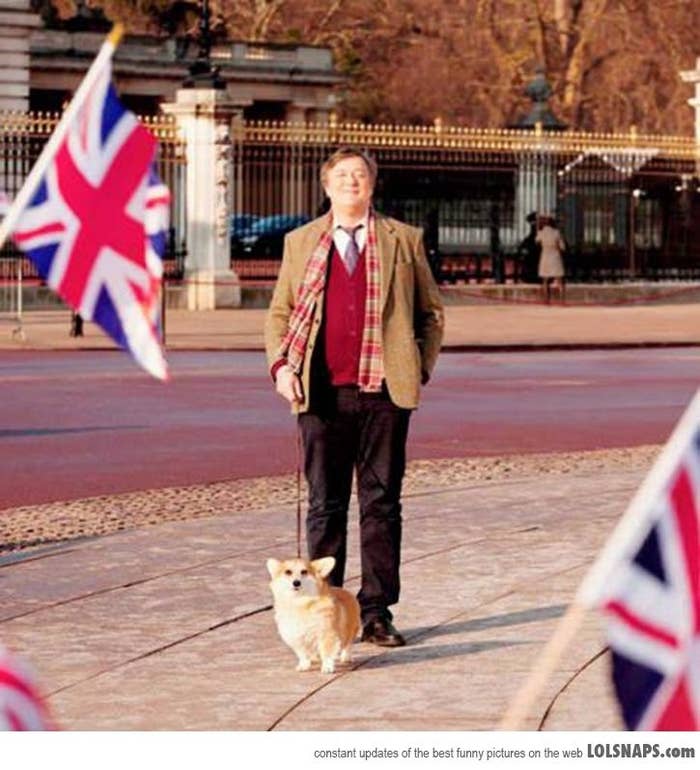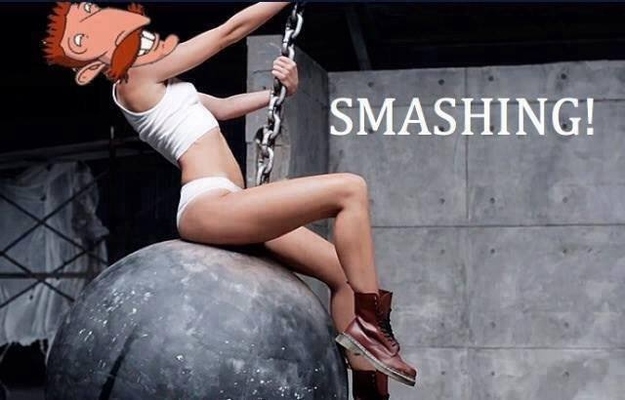Everybody loves a good laugh, and there are infinity plus one reasons to be bent over double, choking on your breath, tears in your eyes guffawing at something. Whether it be a joke, a silly meme or a video of a cat, everybody laughs because we all find some things funny.
But why?
My theory (thought of by me, with very little to no backing - it's just my opinion) focuses on a very select group of humourous bits and bobs - the way things are, and the way things aren't.
Explain, please.
My first port of call is one of my favourite Facebook pages, Nigel Thornberry's Face On Things. Fairly simply, this page takes an image, sticks Nigel Thornberry's face on it, and adds his immortal catchphrase (catchword?), "Smashing!" And it's ridiculously hilarious.
(At this point, I need to say that if you don't know who Nigel Thornberry is, check out some episodes of the Wild Thornberrys and come back into my life an enriched person.)
But why is it so damn funny? Why is the face of a beloved children's character's face on something so laughter inducing?
because it's a representation of the way something is, and the way something isn't.
The character of Nigel Thornberry himself is funny within the context of the program because he, like the first half an hour of Zulu Dawn, is a perfect picture of everything that is British. He's got silly teeth, a funny voice and possesses mannerisms we all automatically think of as undeniably British, and this makes us laugh because it is a stereotype. We all know that not all British people look or behave like this, but it's funny because he's an amalgamation of all the characteristics we subconsciously attribute to the lovely citizens of good old Mother Britain. So, we recognise this stereotype, we recognise our own perception of Britain and it makes us laugh. We are laughing at the way things are, and the way we think about it.

BUT, we are also laughing because of his context. What's this perfect Briton doing in the jungle? What's he doing with a babing wife and daughter (and one not so babing daughter), all of whom are American? WHAT KIND OF MADNESS IS THIS?! In the show, we see that Nigel is a fish out of water - he is a representation of all that is Britain in a context that is so un-British that it might as well be slopping bitter tea all over the Union Flag singing "Born In The USA". And that, too, is funny. We at Nigel simply because he's out of context. We laugh because there is something in this picture that shouldn't be there. Much like a dog wearing human clothes, we're asking ourselves (between gasps for breath), "What on earth is happening?! Why is that there?!" We laugh because our expectation of the way things should be isn't quite met.
Nigel is the perfect joke, because we are laughing at the way things are (his unbelievable Britishness) and the way things aren't (what's he doing there?)
And then we have the Facebook page.

When we add this perfect joke into yet another context, it becomes even funnier, because we have accepted this character (so stereotypical yet so out of context), and then he's put into another context in which he doesn't belong. After watching the show, we accept his context, even though he's so out of context, and then we see that he's out of context again. WHAT THE FLIP IS HE DOING BEING MILEY CYRUS?! Once again, we laugh at the way things are when they're not the way they should be. It's the unexpected element of it, it's that our brain is trying to predict what is going to happen (by seeing Miley Cyrus, or seeing Nigel Thornberry) and then our brain is surprised by seeing that the image is different from our prediction. So we react by laughing. (For a more in depth look at this idea, check our Vsauce's video below. It's informative AND funny.)
The same idea applies to good old fashioned jokes and puns. When we hear a joke, we are led to expect a certain outcome - Why did the kid fall off the swing? But, the punchline surprises us by not being the outcome we expected - Because he had no arms. Whoops, didn't see that coming, better laugh. And that's the way it works. we're surprised, so we laugh because of it. In terms of puns, the wordplay leads us to believe one meaning of a word, but the double entendre makes us see that another possible meaning of a word changes the context of the sentence in a surprising, and thus humourous way.
So, at the end of the day, we laugh because we are surprised by something. We laugh at the way things are, the way things aren't, and the way that causes us to realise that our predicted perceptions aren't always the only way to see things.
But then again, thinking about it too much will mean it's not that funny. Forget everything I've said, and just laugh at Nigel Thornberry. End of story.


